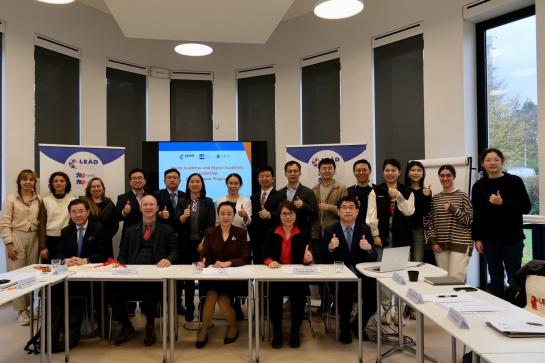
On November 12–13, 2024, the LEAD Academic Network hosted the inaugural Young Academic and Digital Academic Leadership Development Program for a delegation from Shanghai University at the Vrije Universiteit Brussel (VUB) in Brussels. This program marks the beginning of a five-year strategic VUB-SHU partnership aimed at enhancing academic leadership skills and fostering international transdisciplinary cooperation between the two institutions.
Strengthening Ties Through Networked Learning
The program began with welcoming remarks from Prof. Dr. Xuemei YU, Vice President of Shanghai University, who emphasized the university’s commitment to talent cultivation and multidisciplinary research. “We hope that the high-quality international exchanges and discussions across disciplines provided by this training program will inject new vitality into the development of our faculty construction and academic leadership at our university,” Prof. YU stated. She expressed her wish for participants to step beyond their own disciplines, fully engage in transdisciplinary exchanges with international peers, deepen their understanding of the needs of academic leadership and digital academic leadership, and transmit the knowledge with other junior faculty members.

Following her address, Prof. Dr. Chang ZHU, Director of the LEAD Academic Network, introduced the network's 'networked learning' approach designed to connect academic leaders across institutions. “Our goal is to create a collaborative environment where evidence-based knowledge and experiences are shared for mutual growth,” she explained. Prof. Dr. Zhaoheng XU then presented the Shanghai University delegation, highlighting the diverse research backgrounds of each participant.

Interactive Workshops
The morning session featured a workshop on managing academic teams, conducted by Laura PIZZIRANI and Zhengwen QI, researchers from the EU-China Higher Education Research Center. They provided insights into team management theories and facilitated group activities where participants discussed and visualized the practical aspects of managing academic teams in their contexts. The interactive setting encouraged open dialogue and the exchange of effective academic team management strategies.

In the afternoon, Anthony ANTOINE, Executive Director of the Brussels School of Governance, delivered a presentation on academic leadership skills. He addressed the complexities of modern academic management and the importance of adaptable leadership styles. “Effective academic leadership requires navigating challenges with flexibility and strategic insight,” ANTOINE noted. Participants were then presented with a crisis scenario and encouraged to work in groups to develop strategies for crisis management and lead change within the faculty described in the case.

Exploring Leadership Theories in Times of Digital Transformation
The second day opened with Prof. Dr. Chang ZHU delving into various leadership theories and leadship skills as well as the development of digital academic leadership. Participants explored how different leadership styles can be applied to various scenarios and discussed the meaning of digital academic leadership and how to develop it. The session also raised awareness of the potential of artificial intelligence and its implications for education and research.

Later, Prof. Dr. Jan CORNELIS, former Vice-Rector for Internationalisation at Vrije Universiteit Brussel, provided an overview of university governance intertwined with leadership and management principles. He emphasized the potential of university networks to foster creativity and advance research. “Creating institutional platforms for collaboration is essential for driving innovation,” Prof. CORNELIS remarked. The discussion also touched on the role of artificial intelligence in education and the importance of establishing ethical frameworks for its use in universities.

Reflections and Future Endeavors
As the two-day workshop concluded, participants shared their reflections on the lessons learned and the way forward. They underscored the value of cross-disciplinary exchanges and the critical role of effective communication and implementation in cultivating academic leadership. They also emphasized the importance of building both academic leadership and digital academic leadership.
“We are now heading to an unprecedented era filled with challenges but opportunities. We must develop not only academic leadership but also digital academic leadership,” said Prof. dr. Haixing MENG from the Shanghai Institute of Urban Regeneration and Sustainability of Shanghai University. They committed to applying what they had learned in their future endeavors.
“This training has taughe me that leadership can be learned through certain approaches, and I will work on enhancing these leadership skills in the near future”, shared Prof. dr. Jian HUANG from the Materials Genome Institute of Shanghai University.
The delegation from Shanghai University will continue their leadership training with the LEAD Academic Network in Lisbon, Portugal, where they will discuss cross-cultural skills for academic staff and educational accreditation system of Portugal. This ongoing initiative represents a significant step toward strengthening global academic ties and leadership capacities.

